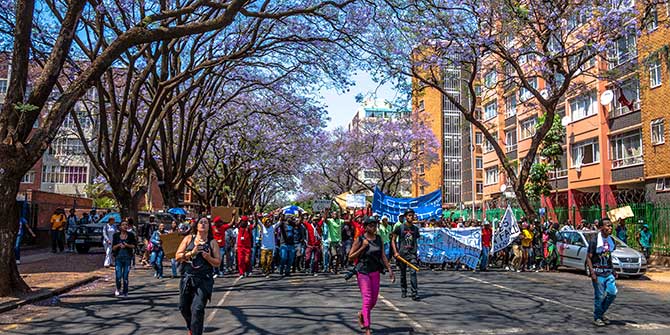Maria Eriksson Baaz and Judith Verweijen’s research among boat operators on the Congo River has given them a deeper insight into state-society relations in the Central African country.
This article is part of the #PublicAuthority blog series, part of the ESRC-funded Centre for Public Authority and International Development.
The Congolese state is often called “predatory”. Indeed, it has a long history of extracting resources from its citizens in a variety of ways. These include fines for real and invented infractions, service fees, and an extraordinary range of “taxes”, many of which have no legal basis. When speaking to Congolese citizens, they are often quick to denounce these imposed contributions as tracasseries (harassment). Yet, as we found in our research among Congolese boat operators on the Congo River, perceptions of taxation are much more complex.
Similar to roads, waterways in the Congo are an important source of taxation. Nationwide, the number of authorities imposing taxes on the waterways has multiplied since the Second Congo War (1998–2003), when military actors intensified their presence. To address this situation, the Union congolaise des armateurs des baleinières (UCAB), the Congolese Union for Operators of Whaleboats (the type of boat most in use on the Congo River), called for an official investigation. This investigation found that throughout the Congo, no fewer that 59 different taxes were levied by around 17 different authorities at different posts.

Image Credit: Molly Bergen/WCS, WWF, WRI via Flickr (CC BY-NC-ND 2.0)
After pressure from UCAB, an interministerial decree was adopted on 19 June 2014 that abolished two thirds (in total 38) of the taxes identified. The decree explicitly prohibited all Congolese security services, including the navy, from imposing taxes. Yet, except from the initial months, the results of the decree were rather meagre and taxation has continued at more or less the same level as before.
While denouncing the system of taxation as a whole, the boat operators we interviewed clearly distinguished between the different taxes and taxing authorities involved, seeing some as more and others as less legitimate. For instance, the presence and taxes of the Commissariat fluvial (riverine commission) and the forces navales (the Congolese navy) were seen as relatively legitimate. Yet the recouvrement, a tax imposed by the provincial authorities at Mushie, was seen as completely illegitimate. This relatively positive perception of the navy and its taxes is quite strange in the light of the bad reputation of the Congolese army. How then can we explain these perceptions of taxation?
In a recently published article co-authored with Ola Olsson, we identify the different factors that, in interaction, shape boat operators’ views and experiences of taxation. Somewhat surprisingly, we found that legality has ambiguous effects on legitimacy. On the one hand, views of different authorities’ right to tax were clearly linked to perceptions of their right to be present on the river, according to official mandates. For example, to argue that the marines’ presence on the river was justified and “official”, many boat operators referred to the navy’s legally-enshrined mandate to assist ships in distress on the river. On the other hand, the invocation of legislation was not systematic. For instance, when speaking about the marines, boat operators rarely invoked the 2014 decree, which explicitly prohibits the navy from imposing taxes. Yet to argue for the illegitimacy of the recouvrement tax, boat operators did recurrently invoke the decree, indicating that it was widely known. Hence, notions of legality were appealed to in selective and, at times, quite contradictory ways.
In addition to the navy’s mandate, many boat operators saw taxation by the marines as relatively official–despite being prohibited by law–because they issue an “official” document (the so-called bulletin de bureau mouvement). This document, which contains information about the boat, destination, and the names of the captain and passengers, is checked and signed at every post by the marines. This practice gives boat operators the idea that they get “something official” in return for their payments.
But the feeling of a “return”, also known as the fiscal exchange principle, was linked most strongly to the navy’s task of rescuing boats. Given that many boat operators overfill their baleinières, shipping accidents are frequent. The navy is therefore seen to be of a certain use. However, the boat operators are aware that– like all Congolese state servants– the marines’ salaries are very low. Moreover, they are generally ill equipped. In the boat operators’ eyes, this justifies the navy asking them for contributions both in money and in kind (namely fuel), which allows the marines to carry out their mandated tasks.
Aside from these forms of official service provision, the navy was also said to engage in non-official service provision. The marines are generally the only authorities that have boats with engines. Therefore, if they allow a boat to pass a post without paying to other authorities, there is not much the latter can do. Owing to the sensitive nature of this practice – paying the navy to avoid paying other authorities – only few boat operators confessed to engaging in this practice. Yet we suspect that it occurs on a wider scale than was reported.
The possibility of tax avoidance is likely to help foster a positive image of the marines’ presence, which in turn affects perceptions of the contributions they impose. This observation leads us to conclude that the “fiscal exchange principle” should not only be analysed in terms of public service provision: private service provision should be taken into consideration too.
Our findings suggest that there is a complex relation between on the one hand, the perceived legitimacy of taxes, and on the other hand, what we call their perceived “officiality” or the sense that something is “official”. “Officiality” is shaped by a range of factors, of which legislation is only one. We should therefore avoid labelling all taxation not sanctioned by legislation a priori as “non-official” or “informal”. Rather, we should carefully examine understandings of “officiality” as held by taxpayers themselves. Moreover, due to the complex and shifting nature of these understandings, we suggest that it is analytically more fruitful to speak of processes of officialisation (and de-officialisation) than to approach “the official” and the “non-official” as binary concepts. Grasping these processes is crucial for a more nuanced insight into state-society relations and the workings of the Congolese state apparatus in general.
Read more about #PublicAuthority and visit our website.
Maria Eriksson Baaz (@MariaEBaaz) is Professor in Peace and Development Research at the School of Global Studies at Gothenburg University in Sweden and Senior Lecturer at the Department of Government, Uppsala University.
Judith Verweijen (@judithverweijen)is an FWO Postdoctoral Research Fellow at the Conflict Research Group, University of Ghent in Belgium.
The views expressed in this post are those of the author and in no way reflect those of the Africa at LSE blog, the Firoz Lalji Centre for Africa or the London School of Economics and Political Science.





